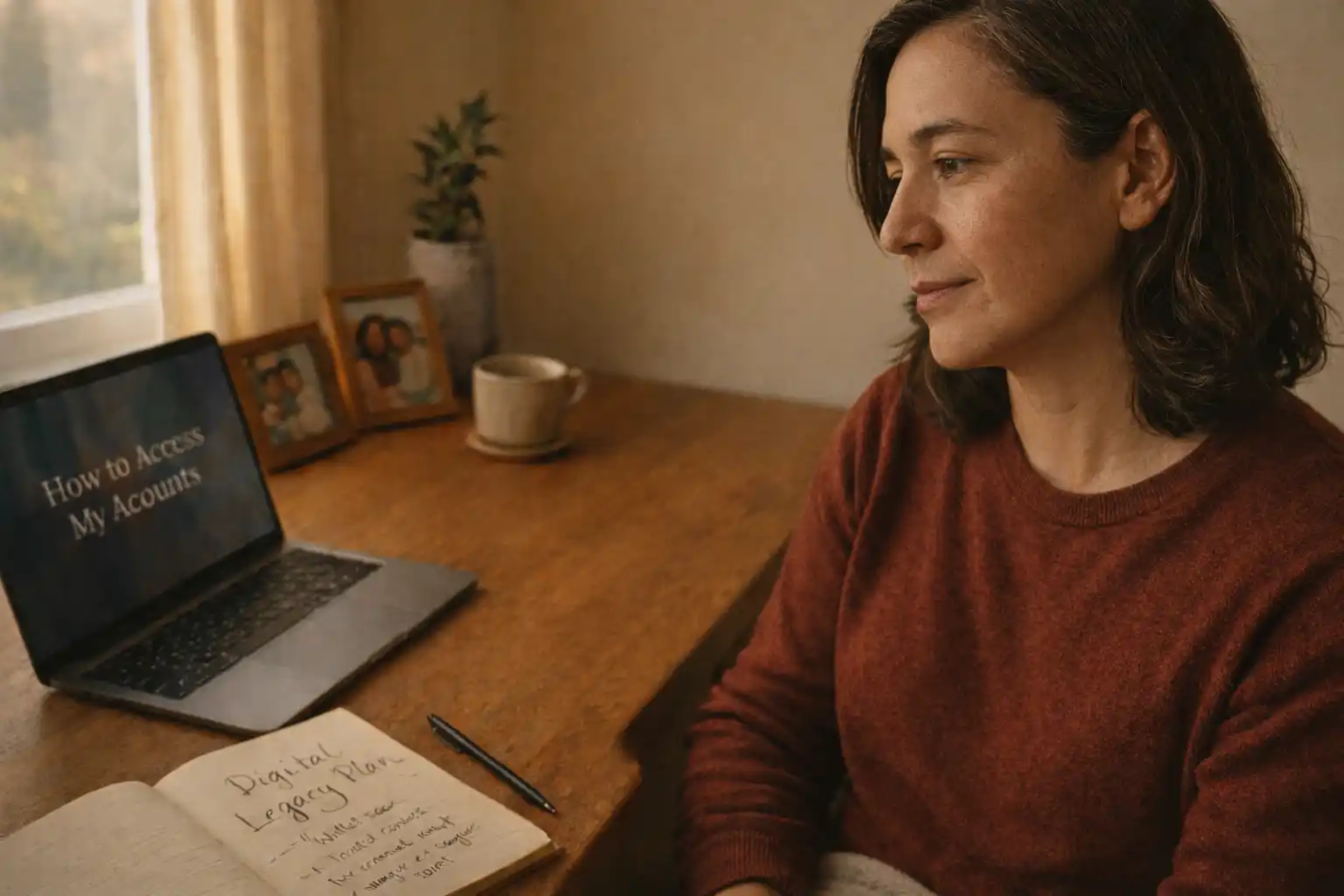Divorce and Death: Planning for Life’s Toughest Transitions
In a recent episode of "Death, Dying & The Digital Age," I had the privilege of talking with Catherine and Karen, the founders of My Divorce Solution. Their journey began over a decade ago when they started a women's empowerment group, which eventually evolved into creating an innovative online platform that helps individuals navigate the complex matters of divorce preparation.

About This Blog
In a recent episode of "Death, Dying & The Digital Age," I had the privilege of talking with Catherine and Karen, the founders of My Divorce Solution. Their journey began over a decade ago when they started a women's empowerment group, which eventually evolved into creating an innovative online platform that helps individuals navigate the complex matters of divorce preparation.
The intersection of divorce and death planning might seem unusual at first glance, but these life transitions share a lot of similarities in terms of preparation, documentation, and emotional complexity. Both events require careful planning, yet people often avoid addressing them until crisis strikes. We explore how these significant life changes intersect and why preparation is crucial in our increasingly digital world.
Timing Matters
When facing either divorce or death, many people's first instinct is to call an attorney, believing legal counsel will solve everything. However, preparation before reaching out to legal professionals can make a huge difference in outcomes. Just like you wouldn't want to make rash decisions about funeral arrangements while in shock, making divorce decisions during emotional turmoil can lead to poor choices.
Proper preparation involves gathering and organizing documentation well in advance. For divorce, this might mean collecting 3-5 years of financial records, while end-of-life planning requires current account statements, medical directives, and estate planning documents. The key is to have these materials organized and accessible before they're needed.
The digital age has complicated both processes, making preparation even more critical. Documents stored in the cloud, cryptocurrency investments, and digital assets require special consideration and expertise to handle properly. Without proper preparation, valuable assets could be overlooked or unfairly divided.
Digital Assets and Transition Challenges
The evolution of digital assets has transformed how we handle divorce and estate planning. What started as simple disputes over personal belongings has evolved into complex negotiations over cryptocurrency holdings, digital businesses, and intellectual property rights.
Cryptocurrency presents challenges in divorce proceedings, as its value can fluctuate dramatically and be easily hidden or transferred. Legal professionals often struggle to address these digital assets properly, sometimes dismissing them with a simple "we'll split it" without understanding the complexities involved in valuation and division.
The rise of digital intellectual property, from online businesses to creative works, adds another layer of complexity. Stories of authors developing valuable IP during marriage highlight the importance of properly documenting and valuing these assets, as they could become significantly profitable in the future.
About Complex Financial Documents and Their Impact
Key financial documents require careful attention during both divorce and end-of-life planning. Here are the essential documents to consider:
1. Retirement accounts and QDROs (Qualified Domestic Relations Orders)
2. Beneficiary designations on all accounts
3. Pre-nuptial and post-nuptial agreements
4. Transfer on Death (TOD) designations
5. Digital asset inventories
6. Estate planning documents
The importance of properly handling these documents cannot be overstated. Missing or improperly executed paperwork can have devastating consequences, as illustrated by cases where retired individuals couldn't access their pensions due to unsigned QDROs or ex-spouses inheriting assets due to outdated beneficiary designations.
Redefining Relationships in Later Life
The traditional notion of "til death do us part" is being challenged by older adults who are increasingly seeking divorce in their golden years. Many women in their 70s and 80s are choosing to leave long-term marriages, often due to years of emotional neglect or concerns about becoming caregivers to spouses who haven't prioritized their health.
This trend highlights the importance of financial autonomy and careful planning, regardless of age. Post-nuptial agreements and separate estate planning can provide protection even within marriage, ensuring individuals maintain control over their assets and healthcare decisions.
The concept of "for better or worse" doesn't mean accepting situations where one partner purposefully makes life worse for both parties. Modern relationships require mutual respect and consideration, particularly when it comes to lifestyle choices that affect both partners' quality of life in their later years.
Considering Divorce? Take Steps Toward Financial Clarity
My Divorce Solution offers a judgment-free platform to achieve financial clarity. Their 10-step process helps individuals gather necessary documentation, analyze their financial situation, and make informed decisions based on data rather than emotions.
The platform provides a safe space to explore options without committing to divorce, focusing on financial empowerment and understanding. This allows couples to make informed decisions about their future, whether strengthening their marriage through better financial planning or proceeding with divorce in a methodical, prepared manner.
Guest resources:
We Chat Divorce Podcast
Facebook
Instagram
LinkedIn
Don't leave any pieces of your legacy to chance. Start developing your end-of-life plan by downloading the My Final Playbook App. Take the free educational course to learn how to organize your legal, financial, physical, and digital assets today.
In the digital age, planning your legacy is just a click away. Until then, keep your password safe and your playbook up to date.
Related Blog
Duis mi velit, auctor vitae leo a, luctus congue dolor. Nullam at velit quis tortor malesuada ultrices vitae vitae lacus. Curabitur tortor purus, tempor in dignissim eget, convallis in lorem.





Comments